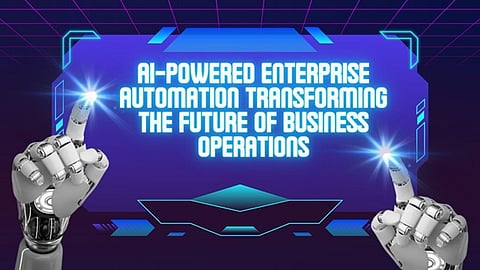

In today’s rapidly evolving digital landscape, artificial intelligence (AI) is revolutionizing industries across the globe. Sravanthi Gopala’s research explores the profound impact of AI on enterprise automation, emphasizing how this transformative technology is reshaping various sectors, including manufacturing, healthcare, financial services, and customer support. As AI solutions continue to evolve, they promise unprecedented efficiency gains, reduced operational costs, and a more agile approach to business challenges.
AI has proven to be a foundation of enterprise automation, which has the potential to optimally define complex processes and admits-organizational-changing business requirements in them. AI automation does not define any fixed rules. So, unlike traditional ones, its features can dynamically extend it by learning, making decisions, and continuously improving it on time. They either improve operational efficiency or facilitate mobility in a competitive marketplace. With AI, organizations can eliminate human errors, improve workflows, and increase new highs in productivity and innovation.
AI has greatly impacted enterprise automation. It takes forward companies from traditional, rule-centric, business-as-usual systems into intelligent automation frameworks. Unlike old automation, which used to reduce complexity in repetitive tasks, AI-powered solutions delve deep in including machine learning, deep learning, and natural language processing (NLP). With the help these advanced technologies, an automating system would be able to adjust, learn, and improve on not just decision-making over time but to automate increasingly more complex processes while at the same time providing highly customized experiences to customers.
Manufacturing is one of the largest sectors reaping dividends from AI-powered automation. Efficiency improvements reported by firms in production have been quite remarkable considering improvements in quality control defects as well as a substantial decrease in overhead charges. For example, AI-based visual inspection systems have yielded about an 89.6% improvement in defect detection rates. This rapid identification of defects, which would be difficult for a human inspector to notice, guarantees that quality for the product is improved while decreasing waste resulting in manufacture capabilities to boost speed as well as accuracy and thus saving costs.
In the financial sector, AI automation is redefining efficiency and risk management. With the implementation of AI-driven systems, financial institutions have achieved impressive reductions in transaction processing times and significant improvements in fraud detection accuracy. AI-powered automation systems are processing up to 83.5% of routine documentation tasks, freeing up human resources for more strategic initiatives.
AI is also making waves in healthcare, particularly in optimizing patient care and improving administrative efficiency. AI-powered solutions have led to a 43.7% reduction in patient waiting times and a 67.2% improvement in diagnostic accuracy. By automating medical data processing and analysis, healthcare providers are reducing administrative errors by 91.3% and operational costs by nearly 39%.
One of the most significant benefits of AI-driven automation is its impact on productivity and customer satisfaction. Across various sectors, organizations have reported significant improvements in handling customer inquiries and delivering personalized services. In customer service, AI has enabled businesses to handle up to 2.7 times more customer inquiries, with response accuracy improving by 84.5%.
Looking to the future, the integration of hyper automation, edge computing, and IoT technologies is set to accelerate the evolution of enterprise automation. Hyper automation promises to automate 83.4% of business processes, reducing workflow costs by 42.7%. Furthermore, edge computing enables real-time data processing at the source, drastically reducing response times and improving operational efficiency.
Autonomous systems are pushing the boundaries of automation technology, offering organizations the ability to make decisions and resolve issues independently. These systems have achieved decision-making accuracy rates of 93.2%, with reduced latency in decision-making.
All those merits notwithstanding, it does not eliminate real challenges. The areas range from data quality management to infrastructure upgrades, where an assurance that adequate technical foundations are put in place is necessary before AI-enabled automation can take off from the ground. It requires huge investments in computing infrastructure and human capital trained to manage these advanced systems for an AI solution citizen.
Indeed, the introduction of artificial intelligence into enterprise automation has been one of the most disruptive forces transforming industries and bringing new possibilities for innovation. And, with the growing trend toward AI-delivered solutions, enterprises would make strides not only in improving operation efficiency but also in gaining market advantage in a digital world. The research of Sravanthi Gopala reveals the potential of AI to bring transformations in business processes and direct future enterprise automation.
